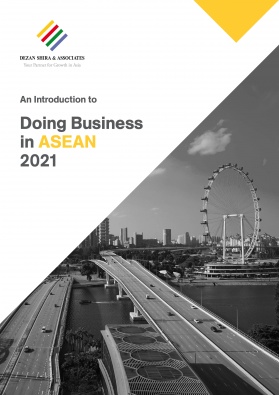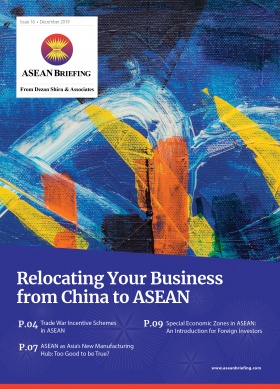Turkey to Forge Closer Ties with ASEAN and Asia
- Turkey is seeking to forge closer ties with ASEAN and Asia through its Asia Anew initiative which was launched in late 2019.
- The Turkish government is keen to point that the Asia Anew initiative does not constitute an axis shift in its foreign policy, but a way to diversify its economic partnerships.
Turkey is seeking to enhance ties with ASEAN and the Asia Pacific region to potentially help revive its economy, plagued by prolonged high inflation, widening deficits, as well as the pandemic.
The Turkish lira lost 20 percent of its value in 2020 alone and the country’s trade deficit widened to US$49.9 billion last year. Furthermore, Turkey’s largest investors, the EU and US, have imposed sanctions on the country, due to its assertive approach to gas exploration in the Mediterranean, as well as the purchase of a Russian made S-400 missile defense system.
As such, in a meeting with ASEAN Ambassadors on January 6, 2021, in Ankara, Turkish Foreign Minister Mevlut Cavusoglu reiterated the importance of improving ties with ASEAN countries. Despite relations with Turkey dating back to 1999, no country in the Southeast Asian region features among Turkey’s top-15 trading partners.
Why ASEAN is a key market for Turkey
Turkey was conferred the status of Sectoral Dialogue Partner of ASEAN during the 50th ASEAN Foreign Ministers’ Meeting (AMM) in August 2017. This enabled the country to deepen cooperation with the bloc in areas such as sustainable development, public-private partnerships, e-commerce, trade and investment, and renewable energy, among others.
According to the Foreign Minister, ASEAN’s dynamic population of 650 million people and combined GDP of over US$3 trillion is an important market for Turkish firms, particularly in the fields of tourism, science and technology, higher education, and infrastructure.Turkey has free trade agreements (FTA) with only two ASEAN members — Malaysia and Singapore — which came into force in 2015 and 2017, respectively.
The country aims to increase trade with Malaysia to over US$5 billion within the next five years from its current US$2.38 billion value, especially in the defense industry. Malaysia mooted the motion of possibly using palm oil to pay for new purchases of Turkish-made weapons and defense systems.
Indonesia is another ASEAN member that Turkey is eager to increase trade with; an FTA between the two countries — the Turkey-Indonesia Comprehensive Economic Partnership Agreement (IT-CEPA) — is still in deliberation. Both countries agreed to increase bilateral trade from US$1 billion to US$10 billion by 2023 in sectors ranging from defense to healthcare.
Indonesia and Turkey collaborated on the development of the Tiger tank, produced by Indonesian weapons manufacturer PT Pindad. Turkish firms have also expressed interest in infrastructure projects related to Indonesia’s new capital, a US$33 billion mega project that will see the country build a new city in the province of East Kalimantan, which will serve as the new capital. Turkish construction firms were involved in moving Kazakhstan’s capital from Almaty to Astana.
Singapore and Turkey enjoy bilateral trade of over US$1 billion and have enjoyed ties going back more than 50 years.
The Turkey-Singapore Free Trade Agreement (TRSFTA) forms the basis of this relationship with many Singaporean-based entities engaging in several substantive investments in Turkey. For instance, PSA International, one of the world’s largest port operators, has its HQ in Singapore and has been operating one of Turkey’s largest ports, Mersin International Port, since 2007. Turkish start-ups also have access to Singapore’s tech ecosystem to expand their business across the region as well as utilize the city-state’s extensive experience in ‘smart cities’ development to benefit Turkish cities.
The Asia Anew initiative
Forging closer ties with ASEAN is part of Turkey’s new foreign policy strategy — dubbed the Asia Anew initiative — which was launched in late 2019.
Under this initiative, Turkey will look to advance relations in Asia. The initiative comprises of four main pillars:
- Improvement of interstate relations;
- Expanding trade in the private sector;
- Expand academic cooperation; and
- Enhance interaction between societies.
As a country whose traditional stance has always been westwards, the Turkish government is keen to point that the Asia Anew initiative does not constitute an axis shift in its foreign policy, but a way to diversify its economic partnerships, especially as relations between Turkey and the West and the Middle East have lately been strained. Moreover, Turkey’s largest trade deficit comes from the Asia Pacific region, with an import bill worth almost US$40 billion.
The Asia Anew initiative intends to address this adverse trade balance by encouraging more exports from Turkey’s private sector to Asia. The country is eagerly trying to capitalize on Asia’s emergence as the center for productivity and future prosperity where 60 percent of the world’s population lives in addition to containing some of the fastest-growing regions, such as ASEAN.
The Turkish Ministry of Trade has identified 17 countries as ‘target countries’ for increased bilateral and commercial relations for 202-2021. These are:
- US;
- Brazil;
- China;
- Ethiopia;
- Morocco;
- South Africa;
- South Korea;
- India;
- Iraq;
- UK;
- Japan;
- Kenya;
- Malaysia;
- Mexican;
- Uzbekistan;
- Russia; and
In addition, the Ministry has issued a list of 28 ‘priority countries’ for the same period. These are:
- Germany;
- Azerbaijan;
- Bangladesh;
- United Arab Emirates;
- Bulgaria;
- Czech Republic;
- Democratic Congo;
- Indonesia;
- Philippines;
- Ivory Coast;
- France;
- Ghana;
- Georgia;
- Iran;
- Italy;
- Canada;
- Qatar;
- Kazakhstan;
- Egypt;
- Nigeria;
- Pakistan;
- Poland;
- Romania;
- Senegal;
- Serbia;
- Tanzania;
- Ukraine; and
- Vietnam.
Through this Asia Anew policy, Turkey could become a key player in the global value chain. China’s Belt and Road Initiative (BRI) is firmly on Turkey’s radar – the country is already connected via the Trans-Caspian International Transport Route and Chinese companies are heavily invested in Turkish infrastructure and energy projects.
As such, Turkey’s strong trade and investment ties to the EU, and historical relationships with the Middle East and North Africa economies can help the country become an alternative hub in the long-term restructuring of regional supply chains, also ultimately enabling Turkey to have a bigger say in the international trade system.
About Us
ASEAN Briefing is produced by Dezan Shira & Associates. The firm assists foreign investors throughout Asia and maintains offices throughout ASEAN, including in Singapore, Hanoi, Ho Chi Minh City and Jakarta. Please contact us at asia@dezshira.com or visit our website at www.dezshira.com.








